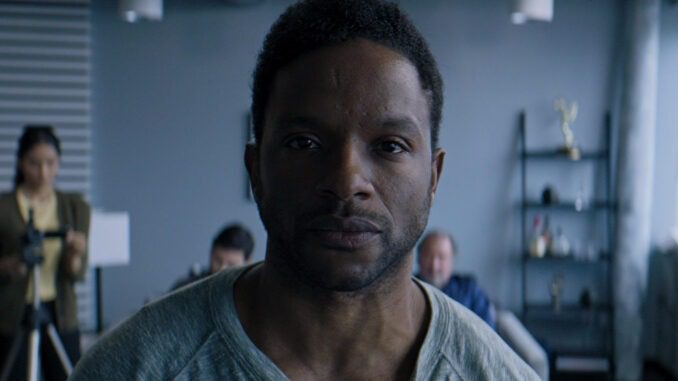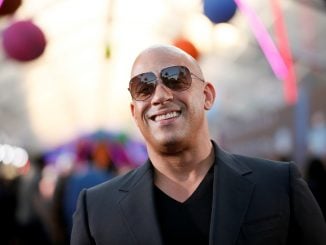
While blockbuster movies spend hundreds of millions of dollars to tell stories of comic book superheroes, many of the world’s best filmmakers are stretching budgets of a few thousand dollars to try to bring huge ideas to the screen. In an ongoing series, we will look at some of the top candidates for this year’s Academy Award in Best Short Film. Directors and producers from Italy to New York, Ireland to China are tackling some of humankind’s biggest issues on a shoestring. In our second installment, we look at Kyle Laursen’s complex, ambiguous take on race in the Hollywood casting process–JOSIAH.
When filmmaker Kyle Laursen set about addressing racial tensions in America, he decided his audience would have to put in some hard work.
“I wanted to make this as thematically complex as possible,” he said.
The result, JOSIAH, is an uncomfortable but realistic look at unconscious bias and power dynamics in the Hollywood casting room.
Laursen takes the issue of race head-on by having his characters work hard to avoid it.
“Not wanting it to feel overly dramatic or serious or forced,” Laursen said, “every decision we made was attempting to walk around, dance around the tension so it was naturally building.”
The result is a layered, nuanced peek inside the casting process.
The film follows Brandon, an actor auditioning for what could be a breakthrough role as a major character in a pilot for a period TV drama. Set immediately after the Civil War, he would play a recently freed slave, working for his former master.
Brandon is the only Black man in the room and is put in a difficult situation when another character raises a concern about the harsh, period-specific language in the script.
It would have been easy, on the filmmaker, actors and audience, to tell the story with clear-cut heroes and villains and take a strong moral stance. Laursen went the opposite way, spending eight months to perfect the 20-page script, then meeting with the cast for an extensive weekend of rehearsals.
“We were constantly asking each other, ‘Is this obvious? Does this feel forced? Does this feel like it would really potentially happen? This confrontation, this moment, does it feel like it happens off-the-cuff enough, or does it feel like we’re being too overt?”
The depth of the script allowed Laursen to attract a strong cast, including Kevin Dunn (Veep), Melanie Chandra (Code Black) and Mather Zickel (Better Things).
“It’s so rich,” Chandra said of the script. “It’s so specific. It left me with this feeling of intrigue. I wanted to talk about it and learn more. It was very unexpected, honestly. I had a visceral response to it. … I was very excited to explore a film that tackled those issues but not completely head-on. I though the way it was done was very subtle.”
“When I first read the script, it had an ambiguity to it that I found really interesting,” Mather added. “I was a little perplexed by it, at first, because I wasn’t quite sure reading it on the page how it would play out. I wasn’t immediately aware where all the characters were coming from.”
That was intentional on Laursen’s part, as he used the weekend of rehearsals to allow the actors the freedom to help find out for themselves.
“He was emphasizing the ambiguity of the situation,” Mather said. “He wanted to see how the characters were going to come together, how the actors were going to meld and envelop this. When we got into the rehearsals, I was very excited. You could tell right away, ‘Oh, I see how this is happening.’ There was just a dramatic tension that almost sort of goes by you, unexpectedly. I was glad to see what seemed like invisible tension at first coming to the foreground. It’s like nothing I’ve done.”
The role of Brandon went to Luke Forbes (Crown Heights).
“Whoever is playing this role has got to be brilliant,” Chandra said. “I was saying, ‘I’ve got to meet this person.’”
Forbes was up to the task, portraying Brandon’s discomfort and frustration and channeling his complex emotions into a stunning audition.
“The ambiguity, in large part, is what attracted me to it,” he said. “The concept of it, the subject matter. I like hard work, and it looked, to be quite honest, like there was a lot of ways to play it. … There’s a lot of nuance in it, a lot of small moments that are captures, a lot of things in there that can get missed in one viewing.”
Laursen shot the film in one day, which he felt added to the on-screen tension.
“We shot 20 pages in one day, three massive shots in 12 hours,” he said. “A lot of people I talked to were like, ‘What are you about to do?’ I didn’t know if it was the right call, but team members were coming on and there was the potential excitement of ‘Can we pull this off?’ That added an air of titillation. It was not that huge of a commitment, so can we try to hit some grand slams in a short window?”
The cast responded to the pressure.
“It was like doing a play,” Forbes said. “It felt like theater. It was kind of like all hands on deck all the time. You’re never not part of the scene. You were never off camera. You had to be constantly listening—you couldn’t take a break once we started rolling, because you’re in it. It added tremendous tension just shooting it that way—long takes, long conversations, it starts to ramp up. We did it seven times, going through it and through it, like kneading the dough, and other things started to rise up.”
Forbes’ own experience with the casting process also served to fuel his performance.
“Look, I’ve been blessed in my career thus far,” he said. “I’ve worked with great people and had the opportunity to work on good material. More than what happens in a room, you witness certain projects come along, see how the casting turns out and wonder if someone like me was considered for that, or why I wasn’t. The red-blooded American male (role)—black men aren’t always put in those categories or looked to helm projects. We still exist, but there’s this paradigm that excludes us from certain aspects of the business. Walking the streets, I can tell you we’re everywhere, but for whatever reason, with the culture makers, we’re still catching up. I certainly brought that into the room with me, and it informed what you saw on the screen as well.”
The finished project, which has earned raves on the festival circuit and plenty of Oscar buzz, shows the urgency with which the filmmaker and crew approached it.
“We have to f***ing make this thing,” Laursen remembers saying near the start.



